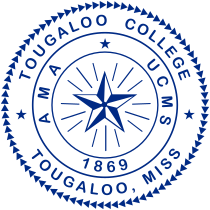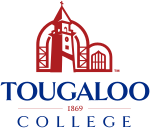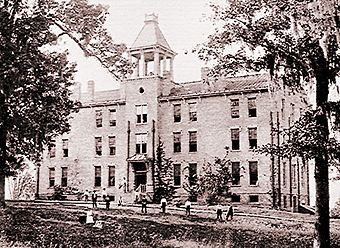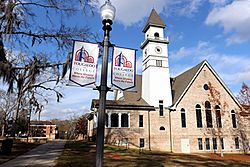Tougaloo College facts for kids

Tougaloo College seal
|
|
|
Former names
|
Tougaloo University (1871–1916) |
|---|---|
| Motto | "Where History Meets the Future" |
| Type | Private historically black college |
| Established | 1869 |
| Affiliation | UNCF |
|
Religious affiliation
|
United Church of Christ and Christian Church (Disciples of Christ) |
| Endowment | $10 million |
| President | Donzell Lee (interim) |
|
Academic staff
|
100 |
| Undergraduates | 650 |
| Location |
,
U.S.
32°24′11″N 90°09′39″W / 32.40306°N 90.16083°W |
| Colors | Royal Blue & Scarlet |
| Nickname | Bulldogs and Lady Bulldogs |
|
Sporting affiliations
|
NAIA – HBCUAC |
 |
|
|
Tougaloo College
|
|

Strieby Hall in 1899
|
|
| Lua error in Module:Location_map at line 420: attempt to index field 'wikibase' (a nil value). | |
| Location | Tougaloo, Mississippi |
| Area | 15 acres (6.1 ha) |
| Built | 1848 |
| NRHP reference No. | 98001109 |
| Added to NRHP | August 31, 1998 |
Tougaloo College is a private college located near Jackson, Mississippi. It is a historically black college (HBCU). This means it was founded to educate African American students. The college is connected to the United Church of Christ and Christian Church (Disciples of Christ).
It was started in 1869 by Christian missionaries from New York. Their goal was to educate formerly enslaved people and their children. From 1871 to 1892, the state of Mississippi helped fund the college as a teacher training school. In 1998, the historic buildings on campus were added to the National Register of Historic Places. Tougaloo College has a long history of working for social justice and civil rights.
Contents
History of Tougaloo College
How Tougaloo College Started
In 1869, the American Missionary Association of New York bought 500 acres of land. This land was once a large plantation in central Mississippi. They wanted to build a college for newly freed slaves and their children. The land included a mansion and other buildings. These were quickly turned into classrooms and living spaces for the school.
The next year, more buildings were constructed. Washington Hall was built for classrooms and a lecture hall. Boarding Hall was a two-story building with a kitchen, dining hall, laundry, and dorms for 30 female students. The United States government helped pay for these buildings. They also provided money for the school's farm, including tools and animals.
Early Years and State Support
In 1871, the Mississippi State Legislature officially recognized the school. They gave it a charter under the name Tougaloo University. The school did not receive money for daily operations. Some students paid a small fee, while others worked on the school farm instead of paying tuition. Local counties also helped pay for some teachers. The American Missionary Association provided most of the other money needed to run the school.
At first, Tougaloo University focused on basic education for black students. It also aimed to train African American students to become teachers. By the end of 1871, the school had 142 students. Most were in elementary classes or training to be teachers. The school needed more space and money. Leaders asked the state of Mississippi for help.
The state then created a State Normal School at Tougaloo. This meant the state would provide $4,000 over two years. This money helped pay teacher salaries, support students, and buy desks. Each county in the state received two free scholarships. Students who planned to teach in Mississippi's public schools received a small weekly payment.
In 1873, Tougaloo University added a department for students who wanted to become Christian ministers. It also expanded its industrial department. This department taught practical skills. They added a cotton gin and equipment for grinding corn. They also started making simple furniture on campus.
On January 23, 1881, Washington Hall, the main classroom building, was destroyed by fire. Classes were held in a new barn for the rest of the school year. A new three-story classroom building, Strieby Hall, was started in May 1881. It was named after M.E. Strieby, a leader of the American Missionary Association.
Tougaloo first offered college-level courses in 1897. The first Bachelor of Arts degree was given out in 1901. In 1916, the school's name was changed to Tougaloo College.
Becoming a Private College Again
Tougaloo mainly trained teachers until 1920. That year, the college stopped receiving money from the state. It then became a fully private college again.
Joining with Other Schools
Over the years, Tougaloo College merged with other schools.
- In 1924, it merged with the Mount Hermon Female Seminary. This school was founded by Sarah Ann Dickey, who also worked with the American Missionary Association.
- In 1954, Tougaloo merged with the Southern Christian Institute. This school was established in Edwards, Mississippi.
Recent Leadership and Gifts
Dr. Carmen J. Walters became the college's fourteenth president in July 2019. She was the second woman to hold this position. She stepped down in June 2023, and Donzell Lee became the interim president.
In 2020, Tougaloo College received a very large gift of $6 million from philanthropist MacKenzie Scott. This was the biggest gift from one person in the college's history.
Presidents of Tougaloo College
- Ebenezer Tucker (1869–1870, as principal)
- Andrew J. Steele (1870–1873, as principal)
- John K. Nutting (1873–1875, as principal/president)
- Leander A. Darling (1875–1877, as principal/president)
- George S. Pope (1877–1887)
- Frank G. Woodworth (1887–1912)
- William T. Holmes (1913–1933)
- Charles B. Austin (1933–1935, as acting)
- Judson L. Cross (1935–1945)
- Lionel B. Fraser (1945–1947, as acting)
- Harold C. Warren (1947–1955)
- Addison A. Branch (1955–1956, as acting)
- Samuel C. Kincheloe (1956–1960)
- Adam Daniel Beittel (1960–1964)
- George Albert Owens (1964–1965, as acting)
- George Albert Owens (1965–1984)
- J. Herman Blake (1984–1987)
- Charles A. Baldwin (1987–1988, as acting)
- Adib A. Shakir (1988–1994)
- Edgar E. Smith (1994–1995, as acting)
- Joseph A. Lee (1995–2001)
- James H. Wyche (2001–2002, as acting)
- Beverly W. Hogan (2002–2019)
- Carmen J. Walters (2019–2023)
- Donzell Lee (2023–present, as acting)
Campus Life and Features
The Tougaloo College campus is located in both Jackson, Mississippi and Madison County, Mississippi. It has a special Historic District with ten buildings listed on the National Register of Historic Places. The Robert O. Wilder Building, also known as "The Mansion," was built in 1860. It overlooks the historic part of the college.
Woodworth Chapel was built by students in 1901. It was restored and reopened in 2002. In 2004, Tougaloo College received an award for its excellent work in restoring the chapel. The chapel is home to the Union Church, which started with the college. Next to the chapel is Brownlee Gymnasium, built in 1947.
Tougaloo Art Collection
The college is proud of its Tougaloo Art Collection. It began in 1963 with help from New York artists, curators, and critics. The collection includes works by African American, American, and European artists. Famous African American artists like Jacob Lawrence, Romare Bearden, and Elizabeth Catlett have pieces in the collection. There are 1,150 works in total, including paintings, sculptures, and drawings.
The Tougaloo Art Colony started in 1997. It gives people the chance to learn from and work with artists.
Civil Rights History and Archives
Tougaloo College also has a Civil Rights Library and Archives. This collection holds important papers, photos, and items from civil rights leaders. These include Fannie Lou Hamer, Medgar Evers, and Martin Luther King Jr.. It also has works by blues musician B.B. King.
The college established the Medgar Evers Museum in 1996. The Evers family donated their home to Tougaloo College because of its historical importance. The home was restored to how it looked when Mr. Evers was assassinated there. It is now a museum open to the public. In 2020, the National Park Service took over the home and made it a national monument.
Academics and Learning
Tougaloo College has played a big role in educating many professionals in Mississippi. The college's website states that over 40% of African American doctors and dentists in Mississippi trained at Tougaloo. Also, more than one-third of the state's African American lawyers and educators, including teachers and school leaders, were educated there.
Tougaloo College is officially recognized by the Southern Association of Colleges and Schools (SACS). This means the college meets high standards for education. It has been accredited by SACS since 1953 and remains in good standing.
Sports at Tougaloo
The sports teams at Tougaloo College are called the Bulldogs. The college is part of the National Association of Intercollegiate Athletics (NAIA). They mainly compete in the HBCU Athletic Conference (HBCUAC), which used to be called the Gulf Coast Athletic Conference (GCAC). They have been part of this conference since 1981.
Tougaloo has 11 different sports teams.
- Men's sports include baseball, basketball, cross country, soccer, and tennis.
- Women's sports include basketball, competitive cheer, cross country, soccer, tennis, and volleyball.
Notable People from Tougaloo College
Faculty Members
- Ernst Borinski (1901–1983), a sociologist.
- L. Zenobia Coleman (1898–1999), a librarian.
- James W. Loewen (1942–2021), an author.
- John U. Monro (1912–2002), director of the writing center.
Alumni (Graduates)
| Name | Class year | Notability | |
|---|---|---|---|
| Reuben V. Anderson | 1965 | first black judge on the Mississippi Supreme Court | |
| Edward Blackmon Jr. | 1971 | Mississippi House of Representatives member | |
| Colia Clark | civil rights activist | ||
| Aunjanue Ellis | attended | actor | |
| Slayton A. Evans, Jr. | 1965 | research chemist and professor | |
| Constance Slaughter-Harvey | 1967 | first black female judge in Mississippi | |
| Lawrence Guyot | 1963 | civil rights activist | |
| Beverly Wade Hogan | 1973 | first female president of Tougaloo College | |
| Joyce Ladner | 1964 | sociologist, civil rights activist | |
| Anne Moody | 1964 | author and civil rights activist | |
| Joan Trumpauer Mulholland | 1964 | civil rights activist and first white student at Tougaloo | |
| Hakeem Oluseyi | 1991 | astrophysicist and science popularizer | |
| Aaron Shirley | 1955 | founder of Jackson Medical Mall | |
| Arthur Tate | first African American in the Mississippi State Senate since the Reconstruction era | ||
| Bennie Thompson | 1968 | U.S. Congressman | |
| Walter Turnbull, PhD | 1966 | founder of the Boys Choir of Harlem | |
| Walter Washington | former president of Alcorn State University | ||
| Karen Williams Weaver | 1982 | Mayor of Flint, Michigan | |
| Charles Young Jr. | Mississippi House of Representatives member | ||
| Tommie Mabry | 2011 | Author and advocate for youth |
 | Audre Lorde |
 | John Berry Meachum |
 | Ferdinand Lee Barnett |


